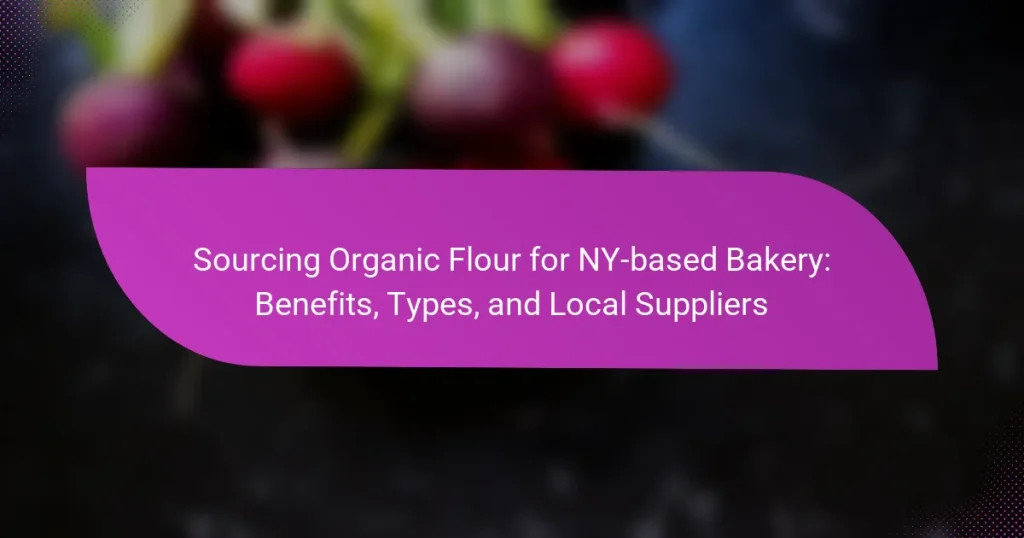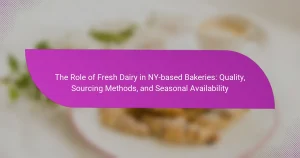Organic flour is flour derived from grains cultivated without synthetic pesticides, herbicides, or fertilizers. This type of flour is increasingly important for New York-based bakeries due to the rising consumer preference for organic products, which are valued for their health benefits and environmental sustainability. The article covers the various types of organic flour available, including whole wheat, all-purpose, bread, and pastry flour, each serving distinct baking needs. Additionally, it highlights local suppliers such as King Arthur Baking Company and Bob’s Red Mill, as well as other sources for obtaining high-quality organic flour. By sourcing organic flour, bakeries can enhance their brand image while contributing to local economies and reducing transportation emissions.

What is Organic Flour and Why is it Important for NY-based Bakeries?
Organic flour is flour made from grains that are grown without synthetic pesticides, herbicides, or fertilizers. It is important for NY-based bakeries because it aligns with the increasing consumer demand for organic products. Many customers prefer organic ingredients for their health benefits and environmental sustainability. Organic flour often has a richer flavor and higher nutritional value compared to conventional flour. Additionally, sourcing organic flour can enhance a bakery’s brand image, attracting health-conscious consumers. In New York, local suppliers often provide organic flour, supporting the local economy and reducing transportation emissions. Thus, using organic flour contributes to both quality and sustainability in bakery operations.
How does organic flour differ from conventional flour?
Organic flour is produced from wheat grown without synthetic pesticides or fertilizers. This method ensures that the flour is free from chemical residues. In contrast, conventional flour often comes from wheat treated with these chemicals. Organic farming practices also promote soil health and biodiversity. Studies indicate that organic crops can have higher nutrient levels. Additionally, organic flour typically undergoes less processing than conventional flour. This can result in a more natural flavor profile. Organic certification requires adherence to strict agricultural standards. These factors collectively highlight the differences between organic and conventional flour.
What are the key attributes of organic flour?
Organic flour is characterized by its production from grains grown without synthetic pesticides or fertilizers. This flour often retains higher nutrient levels compared to conventional flour. Organic flour is typically milled from whole grains, preserving the bran and germ. It is available in various types, including whole wheat, spelt, and rye. The absence of artificial additives is a significant attribute, ensuring a more natural product. Additionally, organic flour often supports sustainable farming practices. Research indicates that organic farming can enhance soil health and biodiversity. These attributes make organic flour a preferred choice for health-conscious consumers and bakers.
Why is the sourcing process crucial for bakeries?
The sourcing process is crucial for bakeries because it directly affects product quality and cost. High-quality ingredients lead to superior baked goods. Sourcing also impacts consistency in flavor and texture. Bakeries rely on specific flour types for desired results. Organic flour sourcing ensures compliance with health standards. Local suppliers can provide fresher ingredients, enhancing taste. Additionally, a reliable sourcing process minimizes supply chain disruptions. This stability allows bakeries to meet customer demand effectively.
What are the benefits of using organic flour in baking?
Organic flour offers several benefits in baking. It is produced without synthetic pesticides and fertilizers. This results in a cleaner product with fewer chemical residues. Organic flour often contains higher nutrient levels. Studies show it can have more vitamins and minerals compared to conventional flour. Additionally, using organic flour supports sustainable farming practices. This contributes to environmental health and biodiversity. Many bakers find that organic flour enhances the flavor of baked goods. The natural ingredients can lead to richer, more complex tastes.
How does organic flour impact the health of consumers?
Organic flour positively impacts the health of consumers. It is produced without synthetic pesticides and fertilizers. This reduces exposure to harmful chemicals. Organic flour retains more nutrients compared to conventional flour. It often contains higher levels of antioxidants and fiber. Studies show that organic grains can improve gut health. They may also lower the risk of chronic diseases. A study published in the Journal of Agricultural and Food Chemistry found that organic wheat has better nutritional quality. This supports the claim that organic flour is a healthier choice.
What advantages does organic flour offer for baking quality?
Organic flour enhances baking quality through superior flavor and texture. It typically contains higher protein levels than conventional flour. This protein contributes to better gluten formation, resulting in improved dough elasticity. Organic flour is also free from synthetic additives and preservatives. This purity leads to a more natural taste in baked goods. Furthermore, organic grains are often grown in nutrient-rich soil. This can increase the overall nutritional value of the flour. Studies have shown that organic products can have a more robust flavor profile. This makes them preferable for artisanal baking.

What types of organic flour are available for bakeries?
Organic flour types available for bakeries include whole wheat flour, all-purpose flour, bread flour, and pastry flour. Whole wheat flour is milled from the entire wheat kernel. It offers a robust flavor and higher nutritional value. All-purpose flour is versatile and suitable for various baked goods. Bread flour has a higher protein content, ideal for yeast breads. Pastry flour is finely milled, perfect for tender pastries and cakes. Other options include rye flour and gluten-free flour blends. Each type serves specific baking needs, catering to diverse recipes and dietary preferences.
What are the different varieties of organic flour?
The different varieties of organic flour include whole wheat flour, all-purpose flour, bread flour, cake flour, and gluten-free flour. Whole wheat flour is made from the entire wheat kernel, preserving its nutrients. All-purpose flour is versatile and suitable for various baking needs. Bread flour has a higher protein content, ideal for yeast breads. Cake flour is finely milled, providing a soft texture for cakes. Gluten-free flour is made from alternative grains, catering to those with gluten sensitivities. Each type serves distinct baking purposes and offers unique qualities for recipes.
How do different types of organic flour affect baking results?
Different types of organic flour affect baking results by varying in protein content, gluten strength, and flavor. All-purpose organic flour typically has moderate protein, providing balanced results for a variety of baked goods. Whole wheat organic flour contains more protein and fiber, leading to denser textures and a nuttier flavor. Bread flour, with its higher protein content, yields stronger gluten structures, ideal for yeast breads. Pastry flour has lower protein, resulting in tender pastries and cakes. Each flour type alters hydration needs and mixing methods, impacting dough handling and final product texture. For example, whole wheat flour absorbs more water, requiring adjustments in recipes for optimal results.
What are the common uses for each type of organic flour?
All types of organic flour serve specific culinary purposes.
Whole wheat flour is commonly used for bread and baked goods, providing a hearty texture.
All-purpose flour is versatile, ideal for cookies, cakes, and pastries.
Bread flour has a higher protein content, making it suitable for yeast breads and pizza dough.
Cake flour is finely milled, perfect for light and tender cakes.
Pastry flour is used for flaky pastries and pie crusts due to its lower protein content.
Rye flour adds flavor and density to rye bread and crackers.
Oat flour is often used in gluten-free recipes and for adding moisture to baked goods.
Almond flour is popular in gluten-free and low-carb baking, providing a nutty flavor.
Coconut flour absorbs moisture well, making it useful in gluten-free and high-fiber recipes.
Each type of organic flour enhances different recipes by contributing unique textures and flavors.
How can bakeries choose the right type of organic flour?
Bakeries can choose the right type of organic flour by considering the specific baking needs and desired product characteristics. They should evaluate the protein content, which affects gluten formation and dough strength. Different types of flour, such as all-purpose, bread, or pastry flour, serve distinct baking purposes. Bakeries should also assess the milling process and grain source to ensure quality and flavor. Organic certification is essential for meeting health and environmental standards. Additionally, local suppliers may offer fresher options that enhance the final product. Research indicates that using locally sourced organic flour can improve taste and support local agriculture.
What factors should be considered when selecting organic flour?
When selecting organic flour, consider the type of grain used. Common options include wheat, spelt, and rye. Each grain has distinct baking properties and flavors. Assess the protein content, as it influences dough strength and texture. Higher protein flours are suitable for bread, while lower protein flours work better for pastries.
Evaluate the milling process. Stone-milled flour retains more nutrients and flavor. Check for certifications, ensuring the flour meets organic standards. Look for local sourcing to support regional agriculture. Freshness is crucial; fresher flour has better flavor and performance. Finally, consider the price to ensure it fits your budget while meeting quality expectations.
How do specific recipes influence the choice of organic flour?
Specific recipes influence the choice of organic flour by determining the required flour characteristics. Recipes for bread often call for high-protein flour to achieve better gluten development. This makes organic bread flour a preferred option. Conversely, pastry recipes may require lower-protein flour for a tender texture. Organic all-purpose flour is commonly chosen for such recipes. Additionally, gluten-free recipes necessitate alternative organic flours, like almond or coconut flour. The choice is influenced by the desired flavor, texture, and nutritional profile. Organic flour can enhance the overall quality of baked goods. Therefore, the specific needs of each recipe guide the selection of the appropriate organic flour type.

Where can NY-based bakeries source organic flour?
NY-based bakeries can source organic flour from local suppliers such as King Arthur Baking Company and Bob’s Red Mill. These companies offer a range of organic flour options. Additionally, local distributors like The Greenmarket Co. provide organic flour sourced from regional farms. Many health food stores in New York also stock organic flour brands. Bakeries can also explore online platforms like Amazon or specialty websites for bulk orders. These sources ensure access to high-quality organic flour for baking needs.
What are the local suppliers of organic flour in New York?
Local suppliers of organic flour in New York include Bob’s Red Mill, King Arthur Baking Company, and Arrowhead Mills. These companies provide a variety of organic flour options. Bob’s Red Mill sources grains from organic farms. King Arthur Baking Company offers a wide range of flours, including whole wheat and all-purpose. Arrowhead Mills specializes in organic whole grain flours. Each supplier emphasizes quality and sustainability in their sourcing practices. These suppliers are accessible to bakeries across New York. They contribute to the local organic food movement.
How can bakeries evaluate the reliability of local suppliers?
Bakeries can evaluate the reliability of local suppliers by assessing their track record and consistency. They should check supplier reviews and ratings from other businesses. Requesting samples can help evaluate product quality. Establishing communication with suppliers is crucial for transparency. Bakeries can also verify certifications and compliance with health standards. Analyzing delivery timelines ensures that suppliers meet demand. Additionally, building relationships with suppliers fosters trust and reliability. These methods collectively provide a comprehensive evaluation of supplier reliability.
What should bakeries look for when visiting suppliers?
Bakeries should look for quality, reliability, and sustainability when visiting suppliers. Quality refers to the freshness and grade of organic flour. Reliable suppliers consistently deliver on time and meet order specifications. Sustainability involves sourcing from suppliers who practice environmentally friendly methods. Bakeries should also assess the supplier’s certifications, such as USDA Organic. Price competitiveness is another factor to consider. Additionally, bakeries should evaluate the supplier’s customer service and support. Strong relationships with suppliers can lead to better deals and communication. These criteria ensure bakeries can maintain high standards in their products.
How can bakeries establish relationships with organic flour suppliers?
Bakeries can establish relationships with organic flour suppliers by initiating direct communication. They should reach out to local suppliers and express interest in their products. Attending industry events can facilitate networking opportunities. Building rapport through frequent interactions enhances trust. Bakeries can also request samples to assess product quality. Establishing clear terms regarding pricing and delivery is essential. Consistent orders can strengthen the partnership over time. Collaborating on marketing efforts can benefit both parties.
What are the best practices for negotiating with suppliers?
The best practices for negotiating with suppliers include thorough preparation, clear communication, and relationship building. Preparation involves researching supplier backgrounds and market prices. This knowledge enables better bargaining leverage. Clear communication ensures both parties understand expectations and requirements. Establishing a rapport fosters trust and collaboration. Flexibility in negotiations allows for creative solutions. Documenting agreements helps avoid misunderstandings. Regular follow-ups maintain the relationship and address issues proactively. These practices contribute to successful supplier negotiations, leading to favorable terms and long-term partnerships.
How can bakeries ensure a consistent supply of organic flour?
Bakeries can ensure a consistent supply of organic flour by establishing strong relationships with reliable suppliers. This involves selecting suppliers who specialize in organic products and have a proven track record. Regularly communicating with these suppliers helps bakeries anticipate demand and supply fluctuations.
Bakeries should also consider entering into contracts for bulk purchases. This can secure pricing and availability, reducing the risk of shortages. Additionally, diversifying suppliers can mitigate risks associated with relying on a single source.
Monitoring market trends is crucial for bakeries to adjust their sourcing strategies accordingly. By staying informed about changes in organic farming practices and flour production, bakeries can adapt their supply chains.
Finally, maintaining a buffer stock of organic flour can provide a safety net during supply disruptions. This proactive approach allows bakeries to continue operations smoothly, even when unexpected challenges arise.
What are some tips for sourcing organic flour effectively?
Source organic flour from reputable suppliers who specialize in organic products. Research local farms that grow organic grains. Visit farmers’ markets to connect with producers directly. Compare prices and quality among different suppliers. Check for certifications that verify organic status. Request samples to assess flour texture and flavor. Establish relationships with reliable suppliers for consistent sourcing. Monitor seasonal availability to plan purchases accordingly.
How can bakeries optimize their sourcing process for organic flour?
Bakeries can optimize their sourcing process for organic flour by establishing direct relationships with local farmers. This approach ensures fresher ingredients and supports local agriculture. Utilizing a supply chain management system can streamline ordering and inventory tracking. Bakeries should also consider joining cooperatives to leverage collective buying power. Regularly reviewing supplier performance can help identify the most reliable sources. Implementing a quality assurance program will ensure the flour meets specific standards. Additionally, staying informed about market trends can help bakeries anticipate price fluctuations. These strategies lead to cost savings and improved product quality.
What common pitfalls should bakeries avoid when sourcing organic flour?
Bakeries should avoid several common pitfalls when sourcing organic flour. One major pitfall is failing to verify certifications. Organic flour must meet specific USDA standards. Another pitfall is neglecting to assess the supplier’s reliability. A consistent supplier ensures quality and availability. Bakeries often overlook the importance of testing flour for performance. Different flours behave differently in recipes. Additionally, many bakeries do not consider the cost implications. Organic flour can be more expensive, impacting pricing strategies. Lastly, bakeries may ignore local sourcing opportunities. Local suppliers often provide fresher products and support the community.
The main entity of this article is organic flour, specifically in the context of New York-based bakeries. The article provides a comprehensive overview of the significance of organic flour, highlighting its health benefits, superior flavor, and environmental sustainability compared to conventional flour. It discusses various types of organic flour available for baking, their unique attributes, and the critical role of sourcing from local suppliers. Additionally, the article outlines best practices for selecting and negotiating with suppliers to ensure a consistent supply of high-quality organic flour, ultimately enhancing the quality of baked goods.




